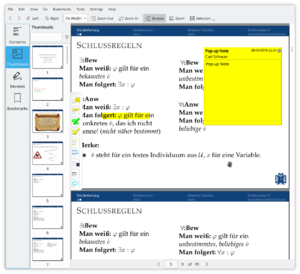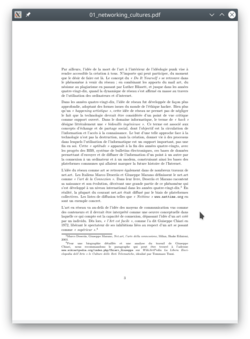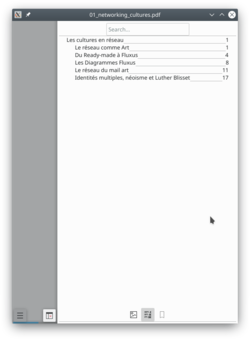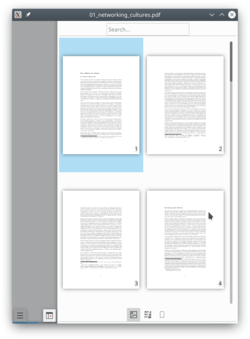Okular
O que é Okular?
O Okular é um visualizador de documentos universal desenvolvido pelo KDE. O Okular funciona em várias plataformas, incluindo, entre outras, Linux, Windows, Mac OS X, * BSD, etc.
Você pode acompanhar o desenvolvimento na página web do projeto.
Contexto
Its development began as part of Google's Summer of Code program. The description of the project can be found at KDE Developer's Corner.
O Okular combina as excelentes funcionalidades do KPDF, com a versatilidade de suportar diferentes tipos de documentos, tais como PDF, Postscript, DjVu, CHM, e outros.
The document format handlers page has a chart describing in more detail the supported formats and the features supported in each of them.

As well as supporting many formats, Okular offers such features as text selection, annotation, extraction of files embedded within a document, and many other surprises. Screenshots of Okular in action can be seen here.
Você pode falar com os desenvolvedores e outros usuários no IRC, irc.freenode.org, canal #okular.
If you are interested in contributing to Okular, please contact the team. Programmers and non-coders are welcome all the same.
Mobile Version
Okular has a mobile version since version 0.16 release in February 2013 [1]. The first version was based on the active framework. The mobile viewer was then ported to Kirigami in 2016 by Marco Martin[2] and finally to Kirigami2 in 2017[3].
The mobile version doesn't support all features from the desktop version, but provide better touch support and a mobile interface.
You can test the mobile version in your PC by entering
okularkirigami
in your terminal. A nightly android version is also available at the KDE binary factory.
Dicas e Sugestões
Revisando documentos / Anotações
Double-clicking on either one of the Review tools (F6) allows you to make multiple annotations without having to reactivate the tool after the first time.
Como manter as anotações feitas no arquivo PDF:
Por padrão, o Okular salva anotações no diretório de dados local para cada usuário. Desde o KDE 4.9, é opcionalmente possível armazená-los diretamente em um arquivo PDF escolhendo , para que possam ser vistos em outros visualizadores de PDF. Observe que esse recurso requer o Poppler 0,20 ou mais recente para documentos PDF comuns. Se o documento PDF que você está anotando estiver criptografado, esse recurso exigirá o Poppler 0.22 ou mais recente.
DRM
By default, Okular follows the PDF specification and don't allow copying text from DRM protected files. However, there is an option in the settings to disable DRM limitations in
There was a small controversy in the Debian bug tracker a long time ago, about the default choice to Obey DRM limitations[4][5]. The choice was then explained by an Okular/KPdf developer[6].
PDF Signature and certificate
Okular can verify if a PDF certificate is valid. But you can not yet create a new signature. See the release note for more information.
More Information
- Official KDE documentation
- Okular website
- Okular API documentation
- Okular phabricator project
- Okular git repository



